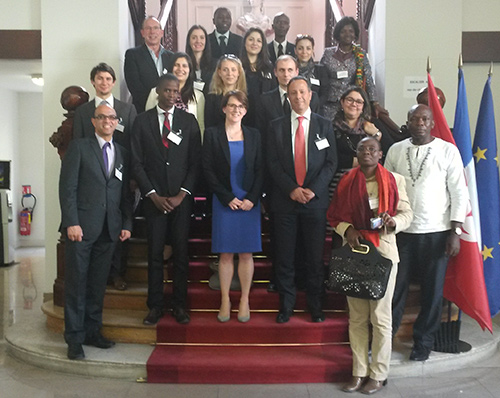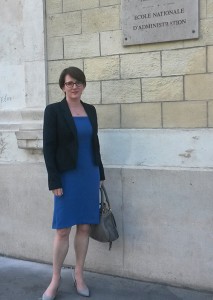21st April 2015 Paris, France
The modern diplomat

In this guest blog, Deputy Head of Mission Kara Owen discusses what it is to be a modern diplomat, after a talk at the Ecole Nationale d’Administration (ENA) in Paris.
This week I was invited to speak on an ENA course about the role of the modern diplomat. In preparing, I cast my mind back to the research I did for my Masters in International Relations where I spent a summer comparing the reporting and activities of the British and French embassies in Berlin in 1932-33 in the crucial months before and after Hitler came to power.
For a month, I lived with my predecessors through their own writing and through books written about them. I was struck when doing so that my 21st century experience of being a diplomat was similar to theirs: I also work at the heart of a relationship between two countries and have many extraordinary “witness” moments.
However, our experiences were also different in a number of ways:

Diplomatic functions: In the 1930s, diplomatic telegrams often “broke the news” to Ministers in London of a war or a revolution. In these times of 24 hour news cycles and twitter, this is very rarely the case. There are also more competitors for one of our key products: analysis. We have to ensure that we add value for the citizen/government by using our excellent contacts to produce great analysis. As power has become increasingly dispersed, we need to have impact on and interact with larger and larger groups of people.
At one time, the commercial and consular functions of a diplomat were seen as somehow “poor relations” of the sexier, more glamorous political roles. Now, no diplomat will be successful if they also can’t protect British nationals in a crisis or understand how to support British business to do well.
Profile: The diplomats of my Masters’ research were pretty homogenous – men of a certain social and educational background (and almost exclusively white). I’m delighted this is no longer the case. The FCO now consciously seeks out people from different backgrounds, genders and with varied prior experience. Only in that way can we harness the creativity produced from tensions between diverse ways of thinking and also represent the nation we serve.
Competences: In the 1930s, social and intellectual skills were prized above all others. Now, we also require the highest standards of leadership and management from our diplomats.. They need to be able to engage staff around a vision, lead them through times of crisis and establish excellent working environment to bring out the best in their staff. They also need to be comfortable enough to engage with people through new and traditional media.
The prolific French Ambassador in Berlin in the 1930s was a former journalist. He wrote beautifully and with great clarity. But I’m not sure he’d have been able to tweet…
Kara Owen
I think you must read about Krishna’a role in mahabharata as a diplomat from pandava side. He gave so much teachings about diplomacy and a role of diplomat. And yes they were more tech savvy than us so it also does not mean that it was old age and their principles does not work today.
I will say that the diplomat have been evoluted ever since. It’s is very good to see this kind of change.
Well, the modern diplomat tells a lot and you did well to let us know about the incident happened in our past. Modern technologies includes, internet, and mobile phones are so friendly that it makes people work as a superman. Thanks for sharing these articles.
great research, also keen to explore the impact of technology especially the Internet, email and voip to the way that diplomats communicate. are we moving towards diplomats based in their home countries and just work from there using communication technologies